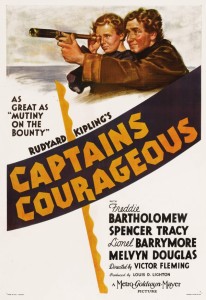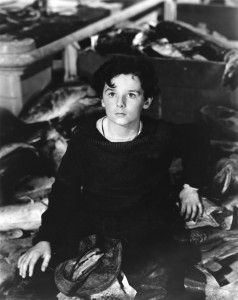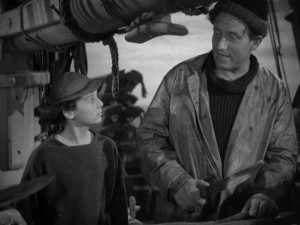 In Victor Fleming’s stirring version of Rudyard Kipling’s popular novel, child actor Freddie Bartholomew (“David Copperfield”) plays Harvey Cheyne, the pampered yet neglected son of a business tycoon, who thinks he cam make his way in life by lying, cheatingand occasionally even crying.
In Victor Fleming’s stirring version of Rudyard Kipling’s popular novel, child actor Freddie Bartholomew (“David Copperfield”) plays Harvey Cheyne, the pampered yet neglected son of a business tycoon, who thinks he cam make his way in life by lying, cheatingand occasionally even crying.Turning point occurs, when Harvey is thrown out of school and travels to Europe with his father, falling off the liner as it passes the Grand Banks. He is then saved by a fishing boat of, where he befriends Manuel (Spencer Tracy), a Portuguese fisherman, who sees to it that the boy gets better manners, kindness and sensitivity.
Indeed, when Manuel is killed in a race with another ship, Harvey is heartbroken, but proves that he has learned a lesson or two in courage and mores from his mentor. In the last scene, that reportedly reduced viewers to tears in the 1930s, Harvey is reunited with his father in Gloucester, lighting a candle in Manuel’s memory.
 Victor Fleming (two years before “Gone With the Wind”) proves to be the right helmer for this coming-of-age sea-adventure, taking full advantage of the great resources of MGM as the studio machine, benefiting from contributions by composer Franz Waxman, art director Cedric Gibbons, and ace lenser Harold Rosson. The film was released on June 25, 1937 to great commercial success.
Victor Fleming (two years before “Gone With the Wind”) proves to be the right helmer for this coming-of-age sea-adventure, taking full advantage of the great resources of MGM as the studio machine, benefiting from contributions by composer Franz Waxman, art director Cedric Gibbons, and ace lenser Harold Rosson. The film was released on June 25, 1937 to great commercial success.
Cast
Manuel (Spencer Tracy) Harvey Cheyne (Freddie Bartholomew) Disko (Lionel Barrymore) Mr. Cheyne (Melvyn Douglas) Uncle Salters (Charles Grapewin) Dan (Mickey Rooney) “Long Jack” (John Carradine)
Best Picture, produced by Louis D. Lighton Actor: Spencer Tracy Screenplay: Marc Connelly, John Lee Mahin, and Dale Van Every Film Editing: Elmo Vernon
Oscar Awards: 1
Actor
Oscar Context
In 1937, nine other movies competed with “Captains Courageous” for Best Picture, including Warner biopic, “The Life of Emile Zola,” which won the top award, Leo McCarey’s marital comedy “The Awful Truth” with six nominations, and Gregory La Cava’s backstage drama, “Stage Door,” with four. The other nominees were: William Wyler’s social drama set in a New York City slum, “Dead End,” Frank Capra’s utopian comedy “Lost Horizon,” and Henry King’s adventure “In Old Chicago,” The first version of “A Star Is Born,” “The Good Earth,” “In Old Chicago,” and the Deana Durbin vehicle, “One Hundred Men and a Girl.” Next to Life of Emile Zola, the most-nominated films were Fox’s adventure “In Old Chicago” and “A Star Is Born.”
Only one of the ten nominated pictures was a comedy, Leo McCarey’s sublime screwball, “The Awful Truth,” co-starring Cary Grant and Irene Dunne at their very best. The Oscars were spread among eight films; the only two pictures that didn’t win any award were “Dead End” and “Stage Door.”
This was Spencer Tracy’s first Best Actor for a role that he himself didn’t like. But it was a “flashy” part, the kind of which impressed Academy voters, what with Tracy’s curly hair and (fake) accent as a Portuguese fisherman.












